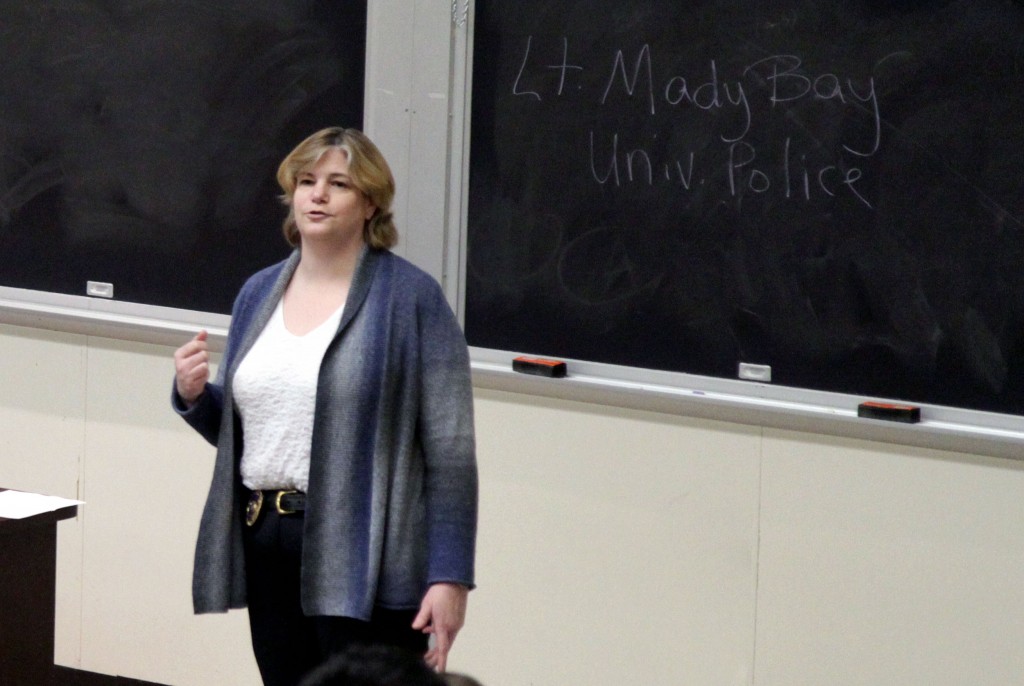
Students worried about the end of mankind were educated on defense tactics in case of a zombie apocalypse by a police officer Wednesday evening, as part of a series of undead-based speaking engagements.
The Zombie Student Association marked its second installment in its four-part “Zombie Survival Series” in Lecture Hall 7 with approximately 30 people in attendance.
Lt. Mady Bay, an officer in Binghamton’s New York State University Police, told students the brain is the survivor’s most important defense when facing danger, whether it’s zombie-related or not.
“Your mind is the No. 1 weapon, in the zombie apocalypse or in real life,” Bay said. “It is necessary to have a survival mindset.”
Bay covered a variety of topics, from responding to active shooters on campus to defense against the average zombie. She stressed the similarities between real world and undead conflicts.
“Zombies aren’t thinking, and shooters aren’t thinking,” Bay said. “Both are distracted, and you can use this to your advantage.”
Bay told students to be prepared for the worst, while refraining from participating in illegal activities.
“On campus, you are not allowed to have guns, so you need to think of other weapons that you are allowed to have,” Bay said. “Anything can be a weapon; what matters is what you are using it for.”
Bay began the event by showing a video on how to respond to active shooters on college campuses before segueing into the undead portion of the event.
“Instead of active shooters, think active zombie,” Bay said.
During the zombie-defense lecture, a student asked which part of the human body should be cut off in case one had to lure a zombie.
“Cut off an ear, maybe,” Bay said. “You need your arms and legs to move around.”
Josh Perry, a graduate student in the student affairs administration program and ZSA E-Board member, said the series was meant to provide enjoyment to the student body.
“I wanted to provide the campus with something to enjoy, that ZSA is able to offer something,” Perry said. “It was important to show that the Zombie Student Association was more than a bunch of people with Nerf guns and blasters.”
Virginia Shirley, a professor in the English department who teaches “ENG300Z: Zombie Nation,” was the first speaker in the series. She said she had been interested in starting a similar series prior to this semester.
“For the last several years, I’ve been trying to get a larger regional or national-size conference off the ground,” Shirley said. “I’m glad the ZSA tried starting one in our own backyard, and networked with people who could really bring both fun and valuable information to the table.”
Shirley also said that while she initially got involved for fun, there are actual benefits to the series.
“Mob violence and panic is as contagious as any virus, and most people don’t know how to handle situations they find themselves in,” Shirley said. “We had the chance to get some serious and useful information out to the campus population and make it fun at the same time.”
Kevin Cardinale, a senior majoring in English who attended the event, said the talks included relevant information despite the fictitious zombie theme.
“While this is built around the framework of a zombie apocalypse, without sounding too crazy, we are in a situation for potential economic collapse,” Cardinale said. “It could not hurt to try and gain a greater understanding for general survival and leadership skills in a dangerous situation.”
The next part of the Zombie Survival Education Series will take place at 7 p.m. on Feb. 29 in Lecture Hall 7. Mark Rice, clinical director of the Binghamton University Counseling Center, will be the speaker for the event.


